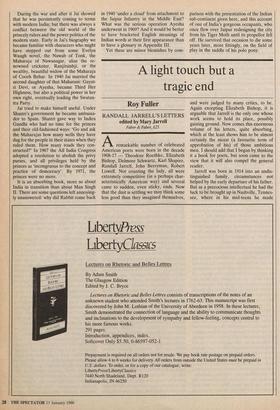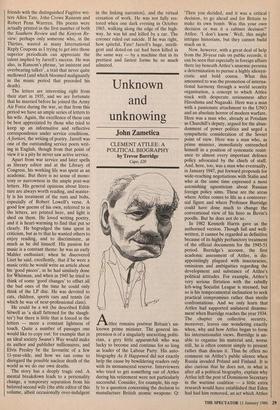A light touch but a tragic end
Roy Fuller
RANDALL JARRELL'S LETTERS edited by Mary Jarrell
Faber & Faber, f25.
Aremarkable number of celebrated American poets were born in the decade 1908-17 — Theodore Roethke, Elizabeth Bishop, Delmore Schwartz, Karl Shapiro, Randall Jarrell, John Berryman, Robert Lowell. Not counting the lady, all were extremely competitive (in a perhaps char- acteristically American way) and several came to sudden, even sticky, ends. Now that the dust is settling we may think some less good than they imagined themselves, and were judged by many critics, to be. Again excepting Elizabeth Bishop, it is arguable that Jarrell is the only one whose work seems to hold its place, possibly gaining ground. Now comes this enormous volume of his letters, quite absorbing, which at the least shows him to be almost certainly the nicest (a favourite term of approbation of his) of those ambitious men. I should add that I began by thinking it a book for poets, but soon came to the view that it will also compel the general reader.
Jarrell was born in 1914 into an undis- tinguished family, circumstances not helped by the early departure of his father. But as a precocious intellectual he had the luck to be brought up in Nashville, Tennes- see, where in his mid-teens he made friends with the distinguished Fugitive wri- ters Allen Tate, John Crowe Ransom and Robert Penn Warrren. His poems were actually printed in the first number of both the Southern Review and the Kenyon Re- view: perhaps only someone who, in the Thirties, wasted as many International Reply Coupons as I trying to get into those superior periodicals can appreciate the talent implied by Jarrell's success. He was also, in Ransom's phrase, 'an insistent and overbearing talker', a trait that never quite mellowed (and which bloomed malignantly in the manic period that preceded his death).
The letters are interesting right from their start in 1935, and we are fortunate that he married before he joined the Army Air Force during the war, so that from this period we have an ample series of letters to his wife. Again, the excellence of these can be best appreciated by those who tried to keep up an informative and reflective correspondence under service conditions. A fortiori, the writing of poetry. Jarrell was one of the outstanding service poets writ- ing in English, though from that point of view it is a pity he never saw active service.
Apart from war service and later spells as literary editor and at the Library of Congress, his working life was spent as an academic. But there is no sense of mono- tony or narrowness in the ample post-war letters. His general opinions about litera- ture are always worth reading, and master- ly is his treatment of the nuts and bolts, especially of Robert Lowell's verse. A good few poems of his own, referred to in the letters, are printed here, and light is shed on them. He loved writing poetry, and it is heart-warming to find that put so clearly. He begrudged the time spent in criticism, but as to that he wanted others to enjoy reading, and to discriminate, as much as he did himself. His passion for music is a constant theme: he was an early Mahler enthusiast; when he discovered Liszt he said, excellently, that if he were a music critic he would write an article about his 'good pieces', as he had similarly done for Whitman; and when in 1945 he tried to think of some 'good changes' to offset all the bad ones of the time he could only think of the LP disc. He was devoted to cats, children, sports cars and tennis (at which he was of near-professional class).
He could be a wit (he described Edith Sitwell as 'a skull fattened for the slaugh- ter') but there is little that is forced in the letters — more a constant lightness of touch. Quite a number of passages one would like to copy out: for example that in an ideal society Swann's Way would make its author and publisher millionaires, and Elvis Presley be the favourite of a few 11-year-olds; and how we can come to disregard the possible nuclear death of the world as we do our own deaths.
The story has a deeply tragic end. A mental breakdown leads to a personality 'change, a temporary separation from his beloved second wife (the able editor of this volume, albeit occasionally over-indulgent in the linking narration), and the virtual cessation of work. He was not fully res- tored when one dark evening in October 1965, walking along the edge of the high- way, he was hit and killed by a car. The coroner ruled out suicide. If he was right, how spiteful, Fate! Jarrell's huge, intelli- gent and doted-on cat had been killed in the same way — by a machine that in its prettiest and fastest forms he so much admired.



























































 Previous page
Previous page